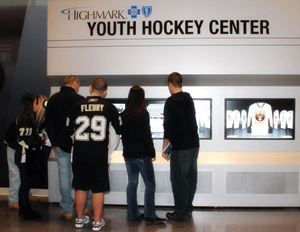Sports entrepreneurs Scott Secord and Kevin Lovitt are marketing software designed to help NHL teams form stronger ties with local hockey programs.
 |
At Consol Energy Center, fans can view real-time stats from area youth hockey leagues.
Pittsburgh Penguins |
Pointstreak Sports Technologies, a 10-year-old Toronto firm, produces Web-based scoring and statistical systems for 3,000 professional and amateur sports leagues worldwide, serving 2.6 million players in hockey, baseball, soccer and lacrosse, according to Pointstreak data.
The company also designs websites and provides content distribution for those leagues. The firm’s data show those sites combined are drawing an average of 6 million visitors a month in 2011.
Over the past year, Pointstreak, under Secord, its president and CEO, has expanded its operation to the NHL, signing deals with the Philadelphia Flyers and Pittsburgh Penguins.
The Flyers partnered with Pointstreak in early October to install computer terminals at the scorer’s tables at 83 community rinks in eastern Pennsylvania, southern New Jersey and Delaware. The Flyers invested $200,000 to modernize those rinks’ scoring systems with digital technology.
In total, the Flyers’ reach through Pointstreak extends to 14,000 youth and adult players, said Shawn Tilger, the Flyers’ senior vice president of business operations.
Flyers President Peter Luukko saw Pointstreak’s scoring system while watching his son Nick play for the Dubuque (Iowa) Fighting Saints at a United States Hockey League game and thought it would be a smart investment, Tilger said.
The Flyers also pay player registration fees. On average those fees are $5 to $9 a player, said Lovitt, formerly with IMG and the NHL Players’ Association and now president of 50/50 Central, a digital raffle system Pointstreak bought in October.
The Flyers get access to a database tied to the websites run by the youth leagues. Every time a boy or girl registers to play hockey, the Flyers capture that information. After registration, users can choose to opt out of receiving Flyers messages.
“It’s a way for us to touch every active member in the youth hockey market in our region through one centralized system,” he said.
Philadelphia’s system was set to be operational by Nov. 11. The Flyers will generate revenue through increased traffic to their website, with the potential of selling more tickets, Tilger said.
The Penguins signed with Pointstreak in spring 2010. Like the Flyers, the Penguins paid for installing the terminals at local rinks and the registration fees for 8,000 players competing in two leagues.
At Consol Energy Center, the Penguins installed Pointstreak’s technology in touch-screen displays at the Highmark Youth Hockey Center on the main concourse. Fans can view real-time scores and statistics from area high school and amateur hockey games.
The Penguins view Pointstreak’s system as a way to give back to the leagues that support them by attending NHL games, said Max Malone, the team’s manager of interactive development. “There is an opportunity to sell sponsorship, but we do not,” Malone said.
Pointstreak’s 50/50 Central has raffle deals with seven major league teams (see box). No teams use both Pointstreak and 50/50 Central, but the firm’s business strategy is for clubs to tap into both systems to further support local hockey.
In Canada, where 50-50 raffles are a big part of the sports culture, the Winnipeg Jets generated about $140,000 on opening night at 15,500-seat MTS Centre. The Calgary Flames, a former investor in 50/50 Central before Pointstreak bought 100 percent of the company, generates an average of nearly $70,000 using the system at every home game, Lovitt said.
One challenge to 50/50 Central is the gambling restrictions in Canada and the U.S. Lovitt, an attorney by trade, says he can sell the system in about 45 states, but in Pennsylvania, home to the Flyers and Penguins as well as two teams in MLB and another in the NBA, raffles are outlawed. The NFL does not allow raffles.
In Toronto, Maple Leaf Sports and Entertainment runs 50-50 raffles the old-fashioned way at Air Canada Centre because of an Ontario law prohibiting automated systems. Pointstreak has a law firm on retainer lobbying regulatory commission officials to change the law.
“We are confident there will be determination to all of this in our favor,” Lovitt said.




